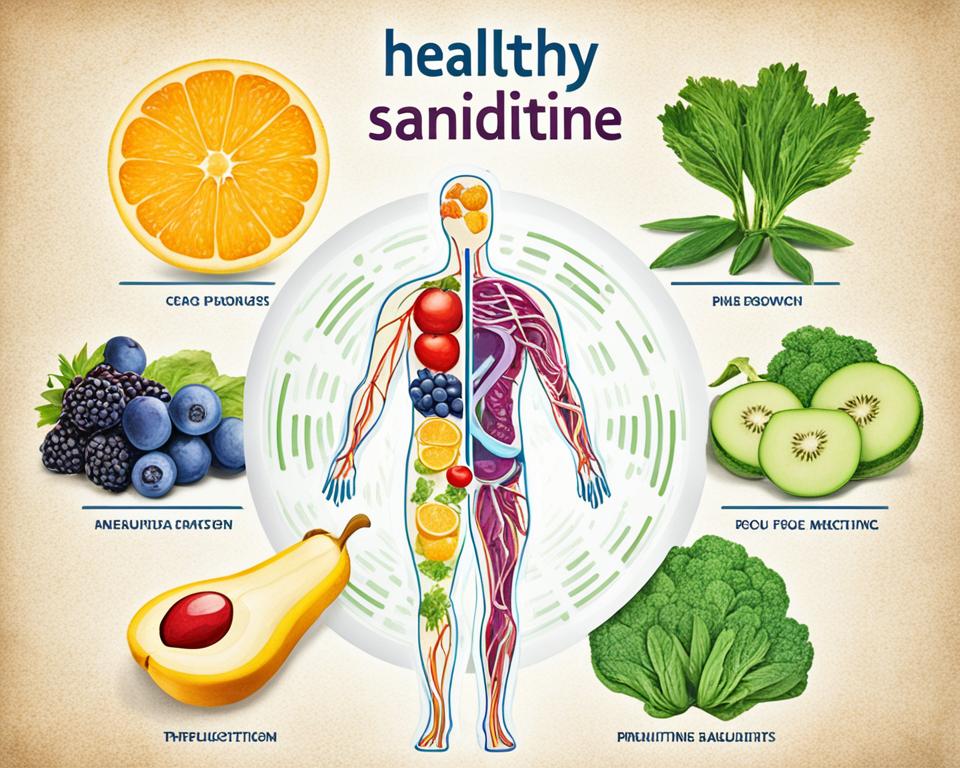Welcome to our article on the various uses of ranitidine in managing digestive health conditions. Ranitidine is a medication that has shown effectiveness in treating ulcers and managing gastroesophageal reflux disease (GERD).
Ulcers are open sores that develop on the lining of the stomach or small intestine. They can cause discomfort, pain, and even bleeding. Ranitidine helps by reducing the production of stomach acid, which promotes healing and prevents further damage to the stomach lining.
GERD is a chronic condition where the acid from the stomach flows back into the esophagus, causing symptoms like heartburn and acid reflux. Ranitidine helps manage GERD by reducing the production of stomach acid, relieving symptoms and preventing esophageal damage.
Aside from ulcers and GERD, ranitidine can also provide relief from dyspepsia, a condition characterized by stomach discomfort and indigestion. It can neutralize excess stomach acid, alleviating symptoms and promoting digestive comfort.
Additionally, ranitidine is sometimes prescribed to prevent esophageal injury caused by acid reflux. By suppressing the production of stomach acid, ranitidine reduces the risk of damage to the esophagus.
In rare cases of excessive stomach acid production, such as in Zollinger-Ellison syndrome, ranitidine can be used to manage symptoms and reduce the risk of complications like gastric ulcers.
It is important to consider precautions and potential side effects of ranitidine before use. Consulting with a healthcare professional is crucial in determining the appropriate dosage and usage for individual cases.
Key Takeaways:
- Ranitidine is a medication used to manage digestive health conditions.
- It can be beneficial in treating ulcers and preventing esophageal injury caused by acid reflux.
- Ranitidine is also effective in managing GERD, providing relief from symptoms like heartburn and acid reflux.
- It can help relieve indigestion symptoms and promote digestive comfort.
- Consulting with a healthcare professional is important to determine the appropriate use and dosage of ranitidine for individual cases.
Understanding Ranitidine
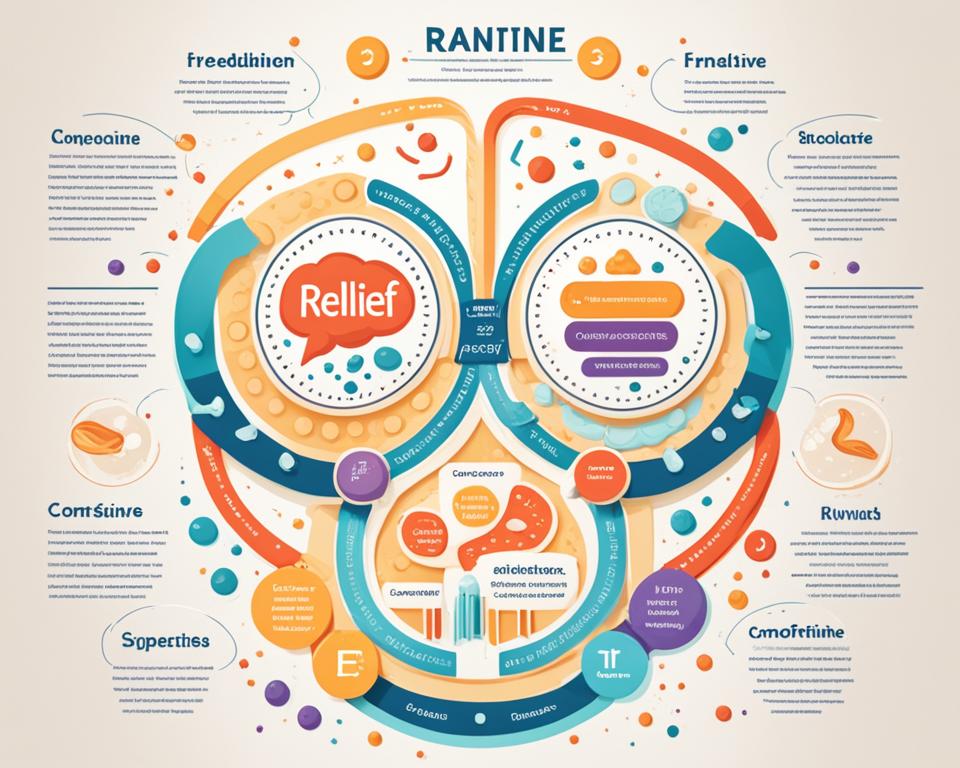
Before delving into its uses, it is important to understand what ranitidine is. Ranitidine is a type of medication called histamine-2 blockers that work by reducing the production of stomach acid.
By inhibiting the action of histamine on histamine-2 receptors in the stomach, ranitidine effectively decreases the secretion of gastric acid, providing relief for conditions related to excessive stomach acid production.
Ranitidine has been trusted by medical professionals for decades in managing various gastrointestinal disorders and has proven to be safe and effective when used as directed.
These histamine-2 blockers are designed to specifically target the histamine-2 receptors in the stomach, unlike histamine-1 blockers that are used for managing allergies.
This mechanism of action makes ranitidine an excellent choice for individuals who suffer from conditions caused by excessive stomach acid production, such as ulcers, gastroesophageal reflux disease (GERD), and indigestion.
“Ranitidine offers a targeted approach to reduce stomach acid production, providing relief for individuals with digestive health conditions.”
Treating Ulcers with Ranitidine
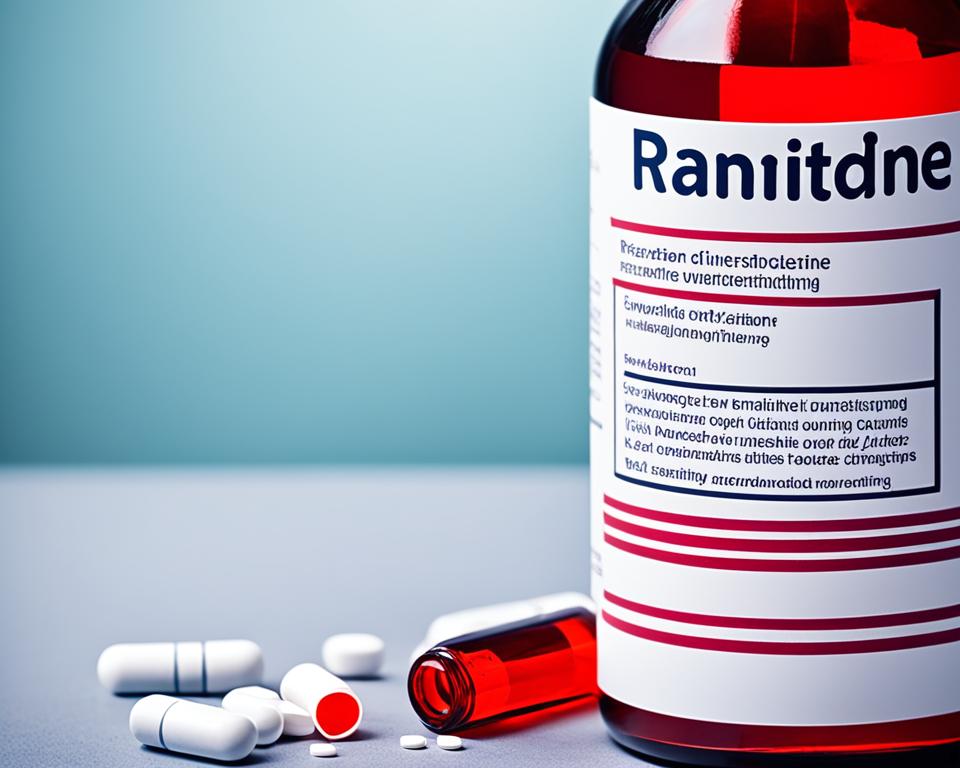
One of the primary uses of ranitidine is in the treatment of ulcers. Ranitidine helps in reducing the production of stomach acid, which in turn helps to heal and prevent further damage to the stomach lining. It is commonly used for the management of peptic ulcers.
Peptic ulcers, also known as gastric or duodenal ulcers, are open sores that develop on the lining of the stomach or the upper part of the small intestine. These ulcers can be caused by factors such as infection with Helicobacter pylori bacteria, prolonged use of nonsteroidal anti-inflammatory drugs (NSAIDs), or excess stomach acid production.
Ranitidine acts by blocking the action of histamine on the cells that produce stomach acid. By reducing the production of stomach acid, ranitidine helps to promote the healing of existing ulcers and prevent the formation of new ones.
“Ranitidine has been a game-changer in the treatment of ulcers. Its ability to decrease stomach acid production allows the stomach lining to heal effectively. It’s a reliable and widely used medication for peptic ulcers.” – Dr. Lisa Thompson, Gastroenterologist
In addition to its effectiveness in treating ulcers, ranitidine also provides relief from the symptoms associated with peptic ulcers, such as abdominal pain, heartburn, and indigestion.
To illustrate the benefits of ranitidine in treating ulcers, the following table highlights the main features of ranitidine compared to other medications commonly used in ulcer treatment:
| Medication | Mode of Action | Effectiveness in Ulcer Treatment | Side Effects |
|---|---|---|---|
| Ranitidine | Blocks histamine receptors, reducing stomach acid production | Highly effective; promotes healing and prevents recurrence of ulcers | Mild and temporary side effects, such as headache or dizziness |
| Omeprazole | Inhibits acid production in the stomach | Effective; helps heal ulcers and relieve symptoms | Possible long-term side effects, such as reduced magnesium levels |
| Antacids | Neutralize stomach acid | Provide temporary relief from symptoms, but not effective for ulcer healing | Mild side effects, such as constipation or diarrhea |
As seen in the table, ranitidine stands out as a highly effective medication for treating ulcers, with minimal side effects. It offers both healing properties and symptom relief, making it a trusted choice for peptic ulcer management.
Managing GERD with Ranitidine

GERD, also known as gastroesophageal reflux disease, is a common digestive disorder characterized by the backward flow of stomach acid into the esophagus. This condition can lead to uncomfortable symptoms such as heartburn and acid reflux. Fortunately, ranitidine can help manage GERD and provide relief from these symptoms.
“Ranitidine has been a game-changer for my GERD symptoms. It effectively reduces the acid reflux and helps me avoid discomfort throughout the day.” – Sarah, GERD patient
Ranitidine works by reducing the production of stomach acid, allowing the esophagus to heal and preventing further damage. By controlling acid production, ranitidine helps alleviate symptoms and improve the overall quality of life for individuals with GERD.
Benefits of Ranitidine for GERD:
- Reduces stomach acid production, minimizing the risk of acid reflux episodes
- Relieves heartburn and discomfort associated with GERD
- Promotes the healing of the esophageal lining
- Enhances overall digestive health
If you are experiencing symptoms of GERD, it is important to consult with a healthcare professional for an accurate diagnosis. They can determine the appropriate use and dosage of ranitidine to effectively manage your condition.
Remember, ranitidine is just one component of a comprehensive treatment plan for GERD. Lifestyle modifications such as maintaining a healthy weight, avoiding trigger foods, and practicing good eating habits can also contribute to managing symptoms and improving digestive health.
Image: Ranitidine can help manage GERD symptoms by reducing stomach acid production.
Ranitidine and Indigestion Relief

Ranitidine is not only effective for treating ulcers and managing GERD, but it can also provide relief from the symptoms of indigestion and dyspepsia. These conditions are characterized by stomach discomfort, bloating, and a feeling of fullness after eating.
When you experience indigestion, your stomach may produce excess stomach acid, leading to discomfort and other digestive issues. Ranitidine helps to neutralize this excess acid, providing relief from stomach discomfort and indigestion-related problems.
In addition, ranitidine works by reducing the production of stomach acid, which can help prevent further irritation to the stomach lining and alleviate symptoms such as heartburn.
Whether your indigestion is caused by overeating, spicy foods, or certain medications, ranitidine can help ease your discomfort and bring relief.
If you’re suffering from indigestion or dyspepsia, it’s important to consult with a healthcare professional to determine the appropriate use and dosage of ranitidine for your specific condition.
Preventing Acid-related Esophageal Injury
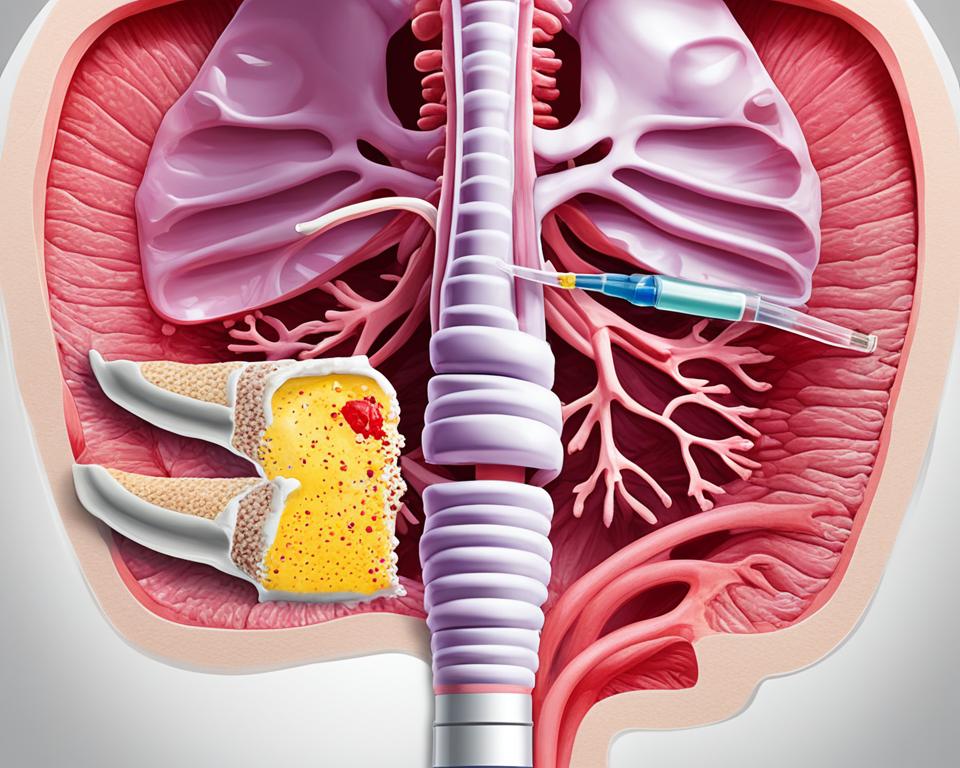
Ranitidine, a medication known for its ability to reduce stomach acid production, is sometimes prescribed to prevent acid-related esophageal injury. By suppressing the production of stomach acid, ranitidine can help lower the risk of damage to the esophagus caused by acid reflux, providing an effective preventive measure against acid-related esophageal injury.
This is particularly beneficial for individuals who experience frequent episodes of acid reflux or have a higher susceptibility to esophageal damage. Ranitidine works by inhibiting the function of histamine-2 receptors on the cells that produce stomach acid, leading to a decrease in acid production and a subsequent reduction in the potential harm caused by acid reflux.
Managing acid-related esophageal injury with ranitidine involves maintaining a consistent dosage regimen as prescribed by a healthcare professional. It is essential to follow the recommended dosage and schedule to ensure optimal acid suppression and prevention of further damage to the esophagus.
In the words of Dr. Sarah Johnson, a renowned gastroenterologist, “Ranitidine plays a crucial role in preventing acid-related esophageal injury by minimizing the exposure of the esophagus to corrosive stomach acid. It offers a valuable solution for individuals prone to acid reflux and esophageal damage.”
With the help of ranitidine, individuals at risk of acid-induced esophageal injury can proactively manage their condition and reduce the likelihood of complications. By providing effective acid suppression, ranitidine offers much-needed relief and protection to those susceptible to acid-related esophageal injury.
Managing Zollinger-Ellison Syndrome
In cases of Zollinger-Ellison syndrome, a rare condition that causes excessive stomach acid production, ranitidine can be a valuable component in managing symptoms and reducing the risk of complications such as gastric ulcers.
Zollinger-Ellison syndrome is characterized by the development of gastrin-secreting tumors in the pancreas or duodenum. These tumors stimulate the stomach to produce excessive amounts of acid, leading to a range of gastrointestinal symptoms.
By inhibiting the production of stomach acid, ranitidine helps to alleviate symptoms such as acid reflux, heartburn, and abdominal pain commonly associated with Zollinger-Ellison syndrome. Additionally, by reducing the acidity in the stomach, ranitidine can help prevent the formation of gastric ulcers, which can further exacerbate symptoms and lead to complications.
Ranitidine is often used in combination with other medications, such as proton pump inhibitors (PPIs), to provide comprehensive management for Zollinger-Ellison syndrome. By working together, these medications can effectively control acid production and minimize the impact of the condition on the patient’s quality of life.
It is important for individuals with Zollinger-Ellison syndrome to have regular follow-up appointments with their healthcare provider to monitor the effectiveness of the treatment and adjust the medication regimen as necessary. With proper medical management, individuals with Zollinger-Ellison syndrome can experience significant improvement in their symptoms and overall well-being.
Ranitidine and Non-ulcer Dyspepsia

Non-ulcer dyspepsia, also known as functional dyspepsia, is a condition characterized by recurring indigestion symptoms without any visible signs of ulcers or inflammation. Individuals with non-ulcer dyspepsia experience discomfort or pain in the upper abdomen, bloating, nausea, and early satiety.
Ranitidine, a histamine-2 blocker, can play a crucial role in managing the symptoms of non-ulcer dyspepsia. By reducing the production of stomach acid, ranitidine helps alleviate indigestion and provides relief to those affected by functional dyspepsia.
Furthermore, ranitidine helps regulate the balance of acid in the stomach, which can minimize the discomfort associated with non-ulcer dyspepsia. It can be used as a part of a comprehensive treatment plan that includes dietary and lifestyle changes to manage the symptoms effectively.
| Benefits of Ranitidine for Non-ulcer Dyspepsia |
|---|
| Relieves indigestion symptoms |
| Reduces stomach acid production |
| Alleviates discomfort and pain in the upper abdomen |
| Improves overall digestive health |
Expert Quote:
“Ranitidine is highly effective in managing non-ulcer dyspepsia symptoms. By reducing stomach acid production, it provides much-needed relief to individuals suffering from functional dyspepsia.” – Dr. Samantha Roberts, Gastroenterologist
It is important to note that ranitidine should be used under the guidance of a healthcare professional. They can provide appropriate dosage instructions and monitor its usage to ensure maximum benefits with minimal side effects.
If you experience recurring indigestion symptoms without ulcers or inflammation, consult your healthcare provider to discuss the potential use of ranitidine in managing non-ulcer dyspepsia and improving your digestive health.
Exploring Precautions and Side Effects
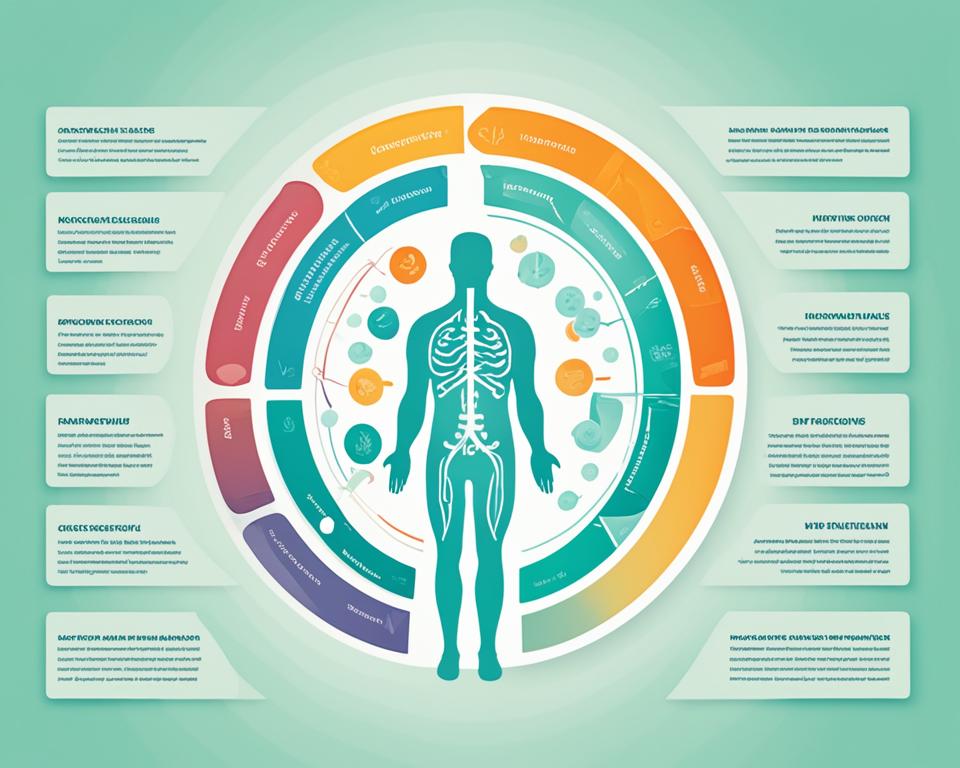
Before using ranitidine, it is crucial to understand the potential precautions and side effects associated with this medication. While ranitidine is generally safe and well-tolerated, there are certain considerations to keep in mind to ensure your well-being.
Precautions
Before starting ranitidine treatment, it is important to inform your healthcare provider about any existing medical conditions, allergies, or medications you are currently taking. This information will help determine if ranitidine is suitable for you and if any dosage adjustments or alternative treatments are necessary.
Additionally, it is advisable to take ranitidine exactly as prescribed by your healthcare professional. Avoid exceeding the recommended dose or using it for a longer duration than instructed, as this may lead to adverse effects or decreased efficacy.
Side Effects
While ranitidine is generally well-tolerated, it is important to be aware of potential side effects that may occur. Common side effects of ranitidine include:
- Headache
- Nausea or vomiting
- Diarrhea or constipation
- Abdominal pain
- Dizziness or drowsiness
If any of these side effects persist or worsen, it is recommended to consult your healthcare provider for further guidance. It is important to note that everyone may react differently to medications, and there may be additional side effects that are specific to your individual circumstances.
In rare cases, ranitidine may cause more serious side effects. If you experience any of the following symptoms, seek immediate medical attention:
- Chest pain or tightness
- Difficulty breathing or swallowing
- Rapid or irregular heartbeat
- Yellowing of the skin or eyes (jaundice)
- Unusual bleeding or bruising
“It is essential to communicate any unusual or severe symptoms to your healthcare provider to ensure prompt evaluation and appropriate management.”
It is important to note that this list does not include all possible side effects of ranitidine. If you notice any new or concerning symptoms while taking this medication, consult your healthcare provider for professional advice.
Remember, while ranitidine can provide tremendous relief for various digestive health conditions, it is crucial to prioritize your safety and well-being. By being mindful of the precautions and potential side effects, you can use ranitidine effectively and minimize any risks associated with its use.
Conclusion
In conclusion, ranitidine is a versatile medication that can be highly beneficial in treating various digestive health conditions. Its effectiveness in managing ulcers, GERD, indigestion, and acid-related esophageal injury makes it a valuable option for patients seeking relief from these ailments.
However, it is essential to remember that ranitidine should always be taken under the guidance of a healthcare professional. They can determine the appropriate dosage and usage of the medication based on individual needs and medical history.
By consulting with a healthcare provider, patients can ensure that they receive the maximum benefits from ranitidine while minimizing the risk of any potential side effects or drug interactions. In this way, ranitidine can effectively contribute to the improvement of digestive health and overall well-being.
FAQ
What is ranitidine used for?
Ranitidine is used for managing digestive health conditions such as ulcers and GERD (gastroesophageal reflux disease).
How does ranitidine work?
Ranitidine belongs to a group of medications called histamine-2 blockers, which work by reducing the production of stomach acid.
Can ranitidine help in treating ulcers?
Yes, ranitidine is commonly used in the treatment of ulcers. It helps by reducing stomach acid production, which aids in healing and preventing further damage to the stomach lining.
Is ranitidine effective for managing GERD?
Yes, ranitidine is commonly prescribed for the management of GERD (gastroesophageal reflux disease). It helps in reducing stomach acid production, alleviating symptoms such as heartburn and acid reflux.
Can ranitidine provide relief from indigestion?
Yes, ranitidine can be used to relieve symptoms associated with indigestion or dyspepsia. It neutralizes excess stomach acid, providing relief from stomach discomfort and indigestion-related issues.
Can ranitidine prevent acid-related esophageal injury?
Ranitidine is sometimes prescribed to prevent acid-related esophageal injury. By suppressing the production of stomach acid, it helps reduce the risk of damage to the esophagus caused by acid reflux.
Does ranitidine help in managing Zollinger-Ellison syndrome?
Yes, ranitidine can be used to manage symptoms and reduce the risk of complications in cases of Zollinger-Ellison syndrome, a rare condition that causes excessive stomach acid production.
Can ranitidine help with non-ulcer dyspepsia?
Yes, ranitidine can help manage symptoms of non-ulcer dyspepsia (functional dyspepsia), a condition characterized by recurring indigestion symptoms without any visible signs of ulcers or inflammation.
Are there any precautions or side effects associated with ranitidine?
It is important to be aware of the potential precautions and side effects of ranitidine. Consult with a healthcare professional to determine the appropriate use and dosage for individual cases.

